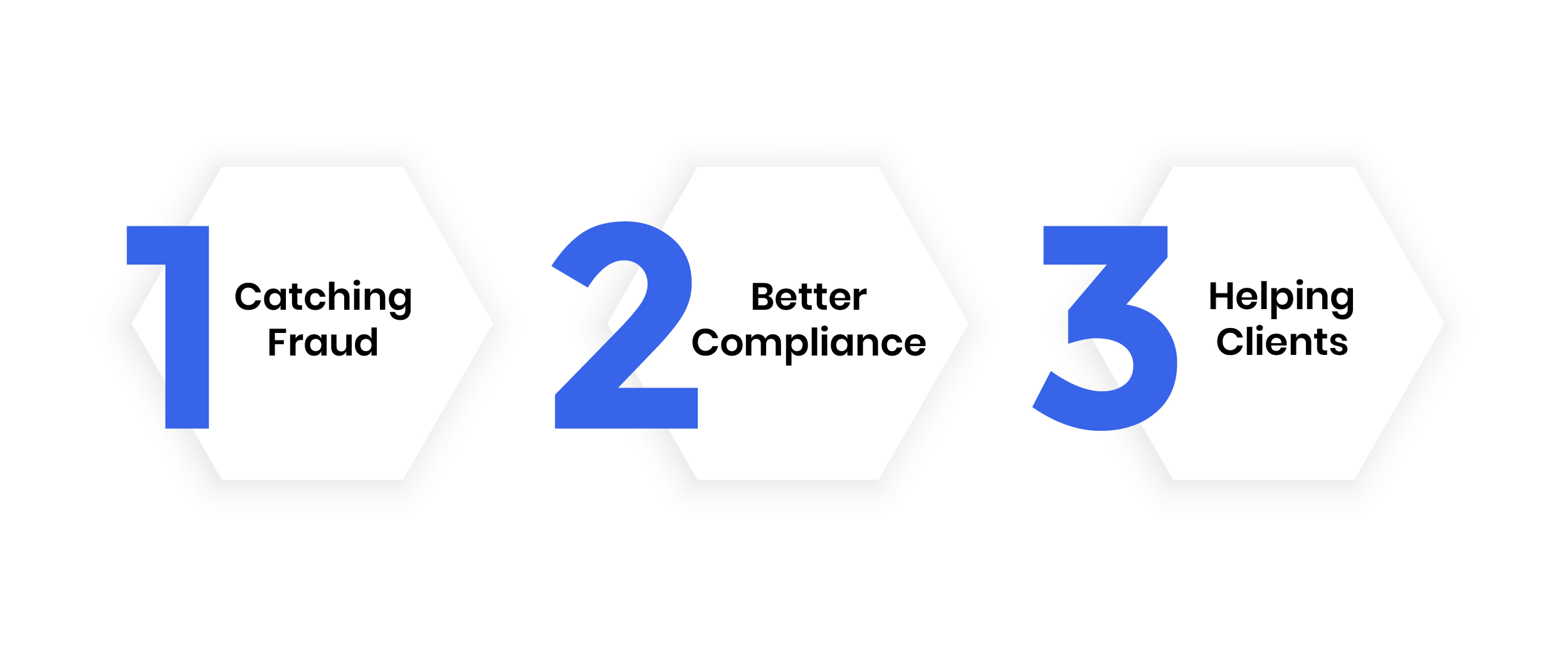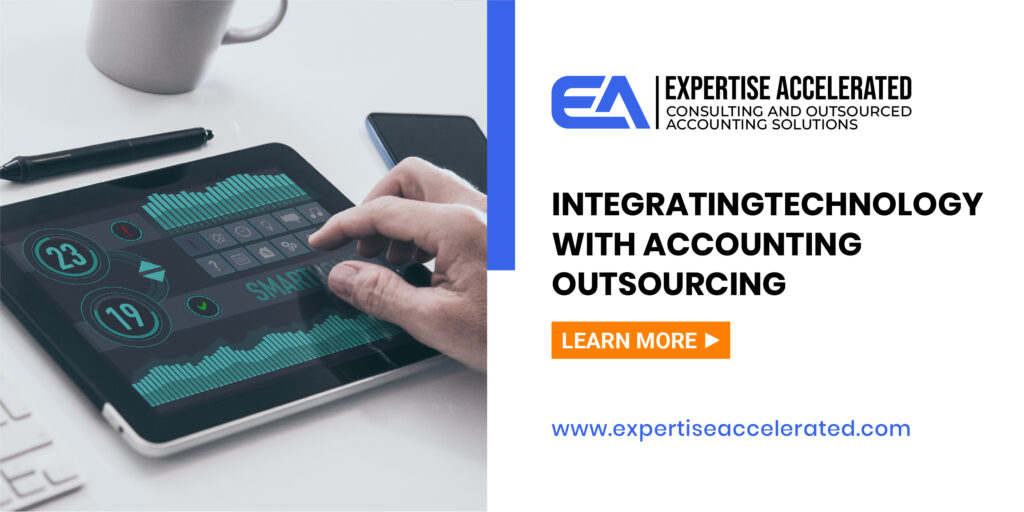Sometimes, companies ask others to help with their money work. This is called outsourcing. When these helpers use computers and smart tools, it makes the work faster and easier. So, using technology with outsourcing helps companies keep their money stuff organized better!
Technology powers daily business tasks, using machines and data to improve decisions. So, ask yourself: are you ready to use technology and stay ahead? In accounting, the answer is yes. New technology can make your work easier, save time and money, and help you do better than others. The future is now, it’s time to start using it.
Bookkeeping and accounting have changed a lot. Tasks once done by hand are now done with smart software. This saves time, reduces mistakes, and improves service.
In the USA, outsourced accounting is growing fast because of these tools. Technology makes accounting quicker, more accurate, and safer. Tech-savvy firms offer smarter and more efficient services.
Clutch says outside helpers do 37% of accounting work, and this number is growing. Using online bookkeeping with these helpers helps businesses save money and work better.
Tech-savvy accounting helps businesses save and grow. This article covers outsourced accounting tech, benefits, and trends in the USA. It shows how accountants use AI and cloud tools to work better and help clients.
The Journey of Accounting Tech
In the past, accounting was manual and slow. The first leap came with computers and spreadsheets. Now, cloud computing, AI, and blockchain have changed how outsourced accounting works. Most accountants like technology and find it helps prevent fraud and follow laws.
In 2024, 82% of accountants said tech helps them communicate with clients. Many want to spend 50% more on tech, and last year they spent about £30,000 on average. Over half plan to use AI, automation, and blockchain to save time and improve advice. But some accountants worry about data safety and losing jobs to AI. They see the good sides of technology but also the risks.
Today, machines automatically read receipts and invoices, saving accountants time for planning. New tools predict future trends using past data. Encryption keeps data safe, and extra log-in steps protect access. Accounting software also alerts businesses to rule changes.
Communication with clients is easier now. Clients can see their financial data right away, which builds trust. Video calls like Zoom make it simple to talk with clients anywhere, saving time and travel. Many tools have mobile apps, so clients can check their numbers anytime from anywhere.
Cloud accounting is growing fast. Over 94% of businesses use it because it is easy to access and helps work run smoothly. More than 80% of firms use AI to do repetitive tasks like sorting transactions and finding errors. Cloud tools let people work together from anywhere.
Automation saves time and money by handling routine tasks, raising productivity by 44%. Businesses can save up to 30% by reducing IT costs and manual work. Automation also lowers mistakes by matching data correctly. Real-time updates help companies make faster, smarter decisions. AI predicts future results from data, helping businesses plan. Chatbots answer questions anytime, freeing up professionals for important work.
Accountants do more than check numbers now. They help with business planning, managing risks, and giving advice. Because technology changes fast, accountants need to keep learning new tools. Machines can make mistakes, so people must check to keep things fair and correct.
According to Forbes, Many people think accounting is old and slow to use new technology. But that’s not true. Technology is changing accounting in a good way, and accounting is helping improve technology too. For example, accountants were the first to use adding machines for tax work. These machines later helped create computers. Recently, accounting helped build better ERP systems, which changed how businesses work.
The Industrial Revolution made business faster and harder. Accountants had to adapt to keep trust. Today’s global business is complex. The 2008 crisis showed how problems spread. Companies use AI accounting and computers for trading, so accountants must ensure money info is accurate and timely. Only technology can keep up with this complexity. For example, Auditing computer trading needs software help.
Before, audits were rare and reports took time. Now, technology lets auditors check data anytime for faster, accurate reports. Accounting used to be manual work, but AI now helps find key info and improve advice. Accountants and CFOs are now vital company leaders.
Switching to new technology can be hard. Old systems were slow and difficult to use. Here are three tips to make it easier: use easy cloud tools (SaaS), get help from support, and learn as a team. Technology will keep improving accounting. It won’t take jobs but will help accountants do more important work. Young accountants will use new tools to do exciting jobs that help businesses grow. Using new tech helps accountants lead and build a better future.
According to Harvard, In 2013, MD Anderson began using IBM’s Watson to help fight cancer. But by 2017, they stopped because it cost over $62 million and wasn’t ready to use on patients. At the same time, their IT team used smart tech to help with bills, hotels, and computer issues. These small projects worked well. They made patients happier, saved money, and gave care managers more free time. Even though the big project stopped, MD Anderson still wants to use AI to help treat cancer. They are working on new AI projects now.
According to Bloomberg, Technology has made accounting faster and more accurate, from computers to data analysis. Now, new AI tools like ChatGPT-4 are ready to change the way accountants work even more. Many companies are testing these AI tools quickly. Teachers and regulators must stay updated to ensure people can trust AI with company finances.
Core Technologies Transforming Outsourced Accounting
Many people now work from home, so businesses use cloud bookkeeping. They store financial info online instead of on paper or office PCs. It updates quickly, stays secure, and makes work easier. Companies can hire remote bookkeepers, saving money and working faster. Cloud tools give access to data anytime, anywhere, helping teams work together. They also let businesses adjust services easily and cut IT costs.
“To learn more about using technology in bookkeeping, read our blog: Staying Competitive by Embracing Technology in Bookkeeping.”
AI tools like ChatGPT help with data entry, organizing bills, and spotting financial patterns. They cut mistakes, boost accuracy, and help predict trends for better decisions. AI also detects fraud early by catching unusual activity quickly.
Modern accounting tools connect with ERP, CRM, and payroll systems to create smooth workflows. ERP helps businesses handle accounting and buying in one place, boosting teamwork and efficiency. These tools give real-time reports and stay updated with laws.
Decentralized ledgers improve security and transparency. Smart contracts automate payments and speed up deals.
Benefits of Cloud Accounting
- Real-time collaboration — improves teamwork and communication.
- Remote access — adds flexibility and convenience.
- Automation — saves time and reduces manual work.
- Centralized data — avoids confusion and errors.
- Strong security — protects sensitive financial information.
- Greater efficiency — speeds up routine tasks.
- Better accuracy — lowers risk of mistakes and compliance issues.
- Cost savings — reduces expenses related to infrastructure and labor.
How Tech in Finance Solves Common Challenges 1. Catching Fraud AI and machine learning help spot fraud faster and more accurately. This lets accountants focus on more important tasks.
1. Catching Fraud AI and machine learning help spot fraud faster and more accurately. This lets accountants focus on more important tasks.
2. Better Compliance Tech tools help meet legal rules and reduce errors. This improves trust and saves time.
3. Helping Clients More clients now ask for help managing money. Tech helps accountants handle these requests more efficiently.
Popular Accounting Software
| Software | Features | Users |
| Quick book online | Real time updates, automation | small/ medium businesses |
| Xero | Easy to use, connects with many apps. | Flexible business. |
| SAP | Powerful and scalable for larger firms | Enterprises. |
Real-World Applications in Outsourced Services
Automation improves accuracy and ensures compliance in bookkeeping and payroll. Tax compliance tools simplify filing and help uncover tax-saving opportunities. AI enhances financial reporting by providing data-driven insights and forecasts. In auditing, blockchain increases transparency, while automation boosts audit reliability.
What’s Next: Future Trends to Watch
In the future, smarter AI and machine learning tools will provide deeper insights, automate more tasks, and detect fraud faster. Accounting platforms will integrate with tech in finances like IoT and big data to give a complete 360° view of finances. At the same time, stronger cybersecurity measures will protect financial data more effectively. These include advanced encryption, authentication, and threat monitoring.
Conclusion
Technology is changing accounting by automating tasks and improving security. It helps accountants focus on giving better advice. Tools like AI, machine learning, and blockchain make accounting faster and safer. Cloud bookkeeping and AI accounting help small businesses compete with bigger ones. In the U.S., these tools improve decision-making, compliance, and protection. As technology grows, outsourced accounting will become even more useful.
Expertise Accelerated is one of the accounting outsourcing companies that provides accounting services USA. EA uses these tools to boost AR accuracy and efficiency. Let us manage your AR so you can focus on growing your business. Contact us today.



